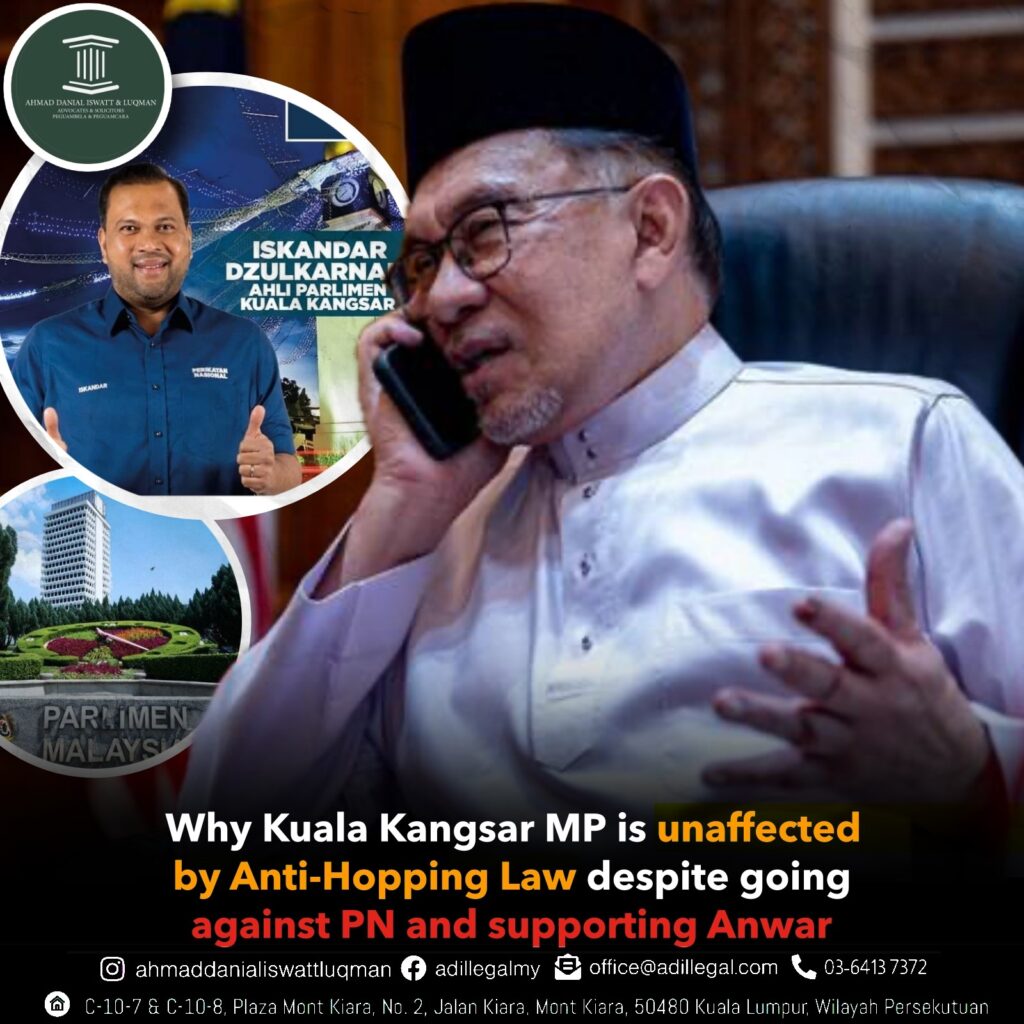
There was yet another twist in the already convoluted storyline of Malaysian politics recently as out of the blue, a Member of Parliament (MP) from the opposition went rogue against his own party and pledged support for Prime Minister Datuk Seri Anwar Ibrahim. In a statement on 12 October 2023, Kuala Kangsar MP Iskandar Dzulkarnain Abdul Khalid said that despite now supporting Anwar, he is still loyal to Bersatu and only made the decision for the benefit of his constituents in dealing with the rising cost of living.
However, the party and by extension, the Perikatan Nasional (PN) coalition were not too pleased by the whole situation. Alleging the Unity Government used intimidation and threats against Iskandar to make him go rogue, PN secretary-general Dato’ Seri Hamzah Zainuddin claims that pressure was put on the Kuala Kangsar MP so that the government retains a two-thirds majority.
While that is a serious matter in itself, our article will be dealing with another issue that arose from the whole situation which many Malaysians have been left confused about. This is in regard to the Anti-Hopping Law, whereby given that Iskandar is an opposition MP, why hasn’t the Anti-Hopping Law kicked into place after he announced support for the Prime Minister and by extension, the government?
Surely safeguarding against MPs jumping from one side to another was the reason why the law was introduced in the first place? Is it even possible for an MP to support the Prime Minister in Parliament while staying on the opposition bench?
Well, join us as we delve into the heart of the matter below.
Anti-Hopping Law
Firstly, let’s establish what the Anti-Hopping law actually is. Unanimously passed in the Dewan Rakyat back in July 2022 and coming into effect on 5 October 2022, the law is enacted via a constitutional amendment as Article 49A in the Federal Constitution.
Furthermore, as a result of the new law, Parliament also amended Article 10 to restrict the freedom of association for MPs subjected to the Anti-Hopping Law, as well as Article 160 and the Eight Schedule so as to make the Constitution consistent with the law.
Section 49A of the Constitution as per the Constitution (Amendment) (No. 3) Act 2022 is as below:
Applied to the subject matter at hand, the main debate on whether the Kuala Kangsar MP’s membership should be vacated under the Anti-Hopping Law is if he has fulfilled the elements prescribed under Article 49A(1)(a). In other words, has Iskandar Dzulkarnain resigned as a member of the political party or ceased to be a member of the political party?
It is also worth noting that the Kuala Kangsar MP’s situation, Article 49A(1)(b) of the Constitution doesn’t apply to him as he was elected to the Dewan Rakyat as a member of Bersatu. The said provision only deals with those who become an MP without being a member of a political party or coalition.
Besides that, the Anti-Hopping Law also prescribed under Article 49A(2) of the Constitution that an MP shall not be affected by the provision if their political party has been dissolved, or if they resigned from the membership of their political party upon election as Speaker or if they were fired by their political party. Meanwhile, Article 49A(3) and 49A(4) of the Constitution detail the procedures of the Anti-Hopping Law, whereby the Speaker has to establish whether a casual vacancy has occurred in respect of an MP’s seat in the Dewan Rakyat within 21 days of being notified in writing by any MP that a casual vacancy has occurred and to notify the Election Commission (EC).
Should the Speaker establish that a casual vacancy has occurred, the EC is required to hold an election to fill that vacancy within 60 days from the receipt of the notification from the Speaker. So, will this happen in the Kuala Kangsar MP’s case?
Well, simply put, no. This is because based on the circumstances around Iskandar Dzulkarnain’s action, he didn’t exert any action that is against the Anti-Hopping Law.
While he has come out and pledged support for Anwar as Prime Minister, the Kuala Kangsar MP didn’t resign as a member of Bersatu or cease to be a member of the party. On the contrary, he stressed that he is continuing to be loyal to Bersatu and only supported Anwar for the sake of his constituents.
While his action contradicts his own claim of loyalty, there’s nothing in the Anti-Hopping Law that forbids an MP from going against their party, unless the matter involves resigning or making them cease to be a member of said party. Sure, Iskandar Dzulkarnain will probably face internal action by Bersatu, but as far as the Anti-Hopping Law is concerned, the Kuala Kangsar MP is unaffected.
Weaknesses and loopholes of the Anti-Hopping Law
With that in mind, the whole situation does highlight one major flaw of the Anti-Hopping Law, whereby an MP can simply go against his party and act as a member of the opposite side without invoking the law. This is because in order for the Anti-Hopping Law to kick in, an MP must either resign or cease to be a member of the political party; something they can simply avoid by not resigning from the party or performing actions that could make their membership from the party be revoked as per the party’s constitution.
This is further exacerbated by Article 49A(2)(c) of the Constitution which expressly establishes that an expulsion of an MP’s membership of their political party won’t incur the wrath of Anti-Hopping Law. This can be seen as a glaring loophole in the law as an MP can simply go against their party and support the opposing side without facing any consequences to their Dewan Rakyat membership. Worse, they can even goad the party to fire them so that they won’t be affected by the Anti-Hopping Law.
In lieu of that, as we’ve mentioned earlier, it is now up to the Dewan Rakyat Speaker to establish whether the Kuala Kangsar MP should vacate his seat or not. However, based on our explanation, Iskandar Dzulkarnain is unaffected by the Anti-Hopping Law and can remain as an MP as long as he doesn’t resign or cease to be a member of Bersatu.
Moving forward, it’d be interesting to see whether the Kuala Kangsar MP’s actions will set a precedent for other MPs to do something similar. Well, for the sake of political stability, let’s hope that this occurrence is just a one-off.
For more insights into the Malaysian legal system such as this, do make sure to follow us on Facebook and Instagram or visit our official website. You can also read our articles on the popular Malaysian news aggregator app Newswav here.
